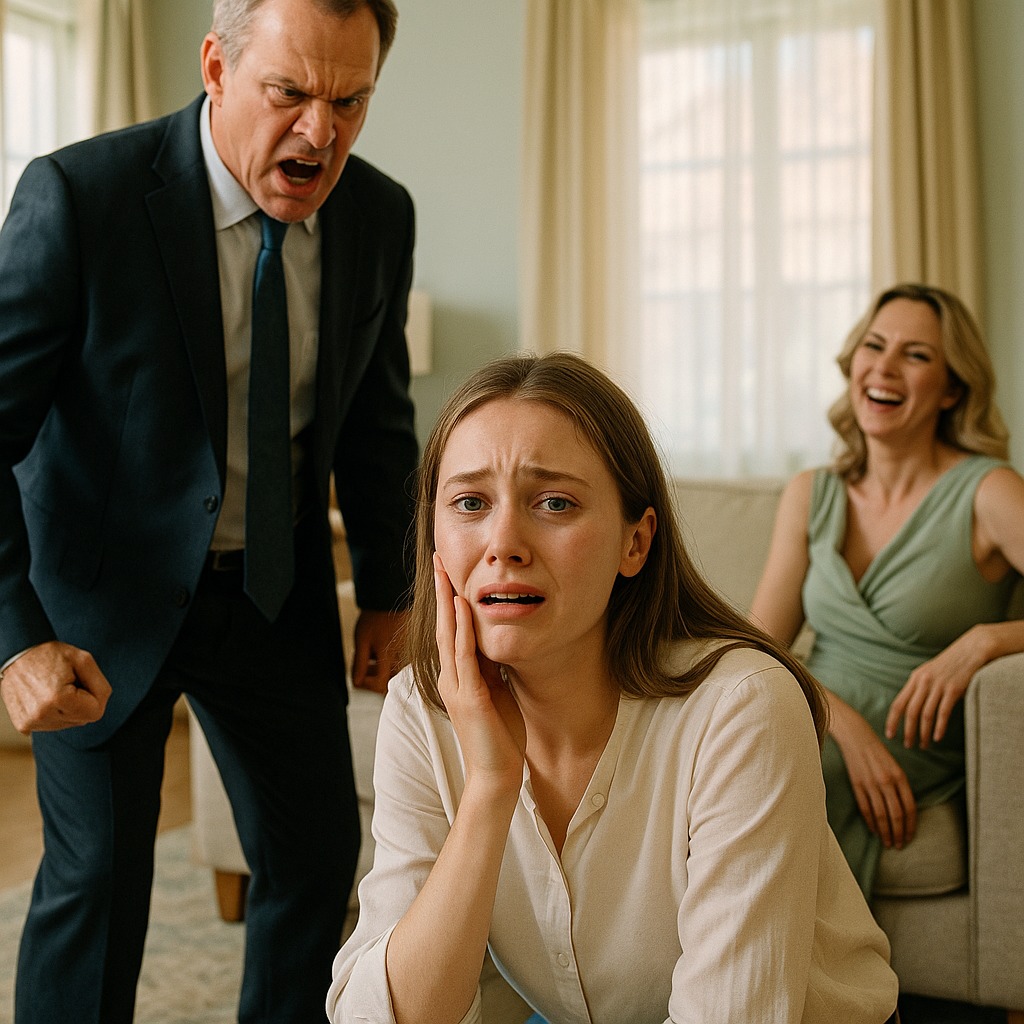The sound came first—the crack, sharp and clean, echoing through the kitchen like a tree snapping in the storm. For a heartbeat I thought something external had broken: a plate, a chair leg, a windowpane. But no. It was my jaw.
My father’s fist had landed with the precision of a craftsman, as if he believed pain was a form of art. Heat spread across my face like wildfire, and I stumbled backward, skidding through coffee that had spilled across the tiles.
The silence afterward was not relief. It was dread.
Then came my mother’s laughter—short, metallic, slicing through the air. She stepped over me as though I were no more than a crumpled rug. “Now you see what happens when you question your place,” she said.
All I had asked was simple: Why must I clean the yard while Kyle sits inside?
Kyle, my older brother, leaned against the doorway. His phone still glowed in his hand, thumb hovering above the screen, lips curled into a smirk. He didn’t need to join in. His silence was its own cruelty, a confirmation that the hierarchy was fixed: him above, me below.
My father sat back at the table, knife slicing through pancakes, his voice gruff. “Get up, unless you want another reminder.”
The metallic tang of blood coated my mouth. My jaw throbbed. I whispered, “I’m fine.”
“You’ll be fine once you learn,” he muttered, chewing.
My mother flipped the next pancake, humming lightly. “And wash your face. Don’t make the neighbors think we’re savages.”
By evening, the swelling had grown grotesque. In the mirror I saw not myself but a bruised mask. Purple shadows crept toward my eye. A lip split open like a seam under strain. My reflection looked like someone already defeated. But somewhere underneath the bruises, something sharpened.
This couldn’t continue.
I sat on my bed, sketchbook open on my lap. Normally, I filled the pages with doodles—flowers, stars, half-finished characters from stories I made up to distract myself. But that night, the pencil moved differently. Not doodles. Plans.
An escape wasn’t enough. Escape meant running, hiding, disappearing. What I wanted was something else: reclamation. I wanted them to know I would no longer bend.
The next morning, Kyle sprawled on the couch again, laughing at a video on his phone. “You missed a spot in the yard,” he said, not even glancing up.
I looked at him, and for the first time in years, I didn’t feel envy. I felt pity. His throne was fragile: a couch cushion, a screen, and parents who mistook cruelty for guidance.
“I’m not doing it,” I said quietly.
His head snapped up. “What did you say?”
“You heard me.”
He sneered. “Dad!”
My father appeared from the kitchen, belt dangling from his hand like a coiled snake. “What now?”
“I said I’m not doing it,” I repeated. My voice shook, but the words stood firm.
His eyes narrowed. “You want another lesson?”
“Try,” I said. My knees trembled, but inside, something stronger than fear anchored me.
The belt never fell. Perhaps it was the way I stood, unflinching, or the small crowd of neighbors gathered outside near the fence. Maybe it was luck. But he hesitated.
That hesitation was all I needed.
I bolted—past Kyle’s shout, past my mother’s gasp, through the door and into the open air. My legs carried me faster than my thoughts could catch up. Down the block, around the corner, until the house that had been both prison and battlefield was nothing but a shadow behind me.
I ended up at the community library, one of the few places that had always felt safe. The librarian, Mrs. Patel, saw my bruised face and pressed a hand to her chest. “Oh, child…”
The words spilled before I could stop them. Not everything, but enough. She didn’t ask unnecessary questions. She called a counselor. She called a shelter. And by nightfall, I wasn’t alone anymore.
The weeks that followed were a blur of paperwork, statements, questions. The authorities knocked on my parents’ door, not to scold me, but to confront them. Kyle’s smirk reportedly faltered when the police car idled in front of the house.
I stayed at the shelter at first, surrounded by others who carried their own scars. For the first time, I realized my story wasn’t unique. That realization both hurt and healed.
School became different too. Whispers spread, but so did support. Teachers who had once ignored my quietness began to notice my resilience. Friends I never thought I had brought me notebooks, pencils, small tokens to remind me I wasn’t invisible.
Months later, I returned—not to live, but to collect the last of my things.
Kyle watched from the porch, his phone silent in his hand. My father stood rigid at the window, arms crossed, but he didn’t move. My mother’s face was pale, her eyes darting nervously to the neighbors who lingered nearby.
I walked past them, head high, into the room that had once been mine. The walls were bare, but the air no longer felt suffocating. I gathered my books, my sketches, my memories.
On the way out, I paused at the doorway.
“This was the last time,” I said.
Neither of them replied. But silence, this time, wasn’t submission. It was acknowledgment.
Now, months later, the bruises are gone, though faint scars remain. But scars are not signs of defeat; they are records of survival.
I draw again, not plans of escape, but visions of the future. My sketchbook is filled with faces that smile, hands that heal, and houses that shelter instead of trap.
Because I learned something in the sharp crack of that morning: cruelty may shatter bones, but it can also awaken steel.
And once awakened, steel does not bend.
